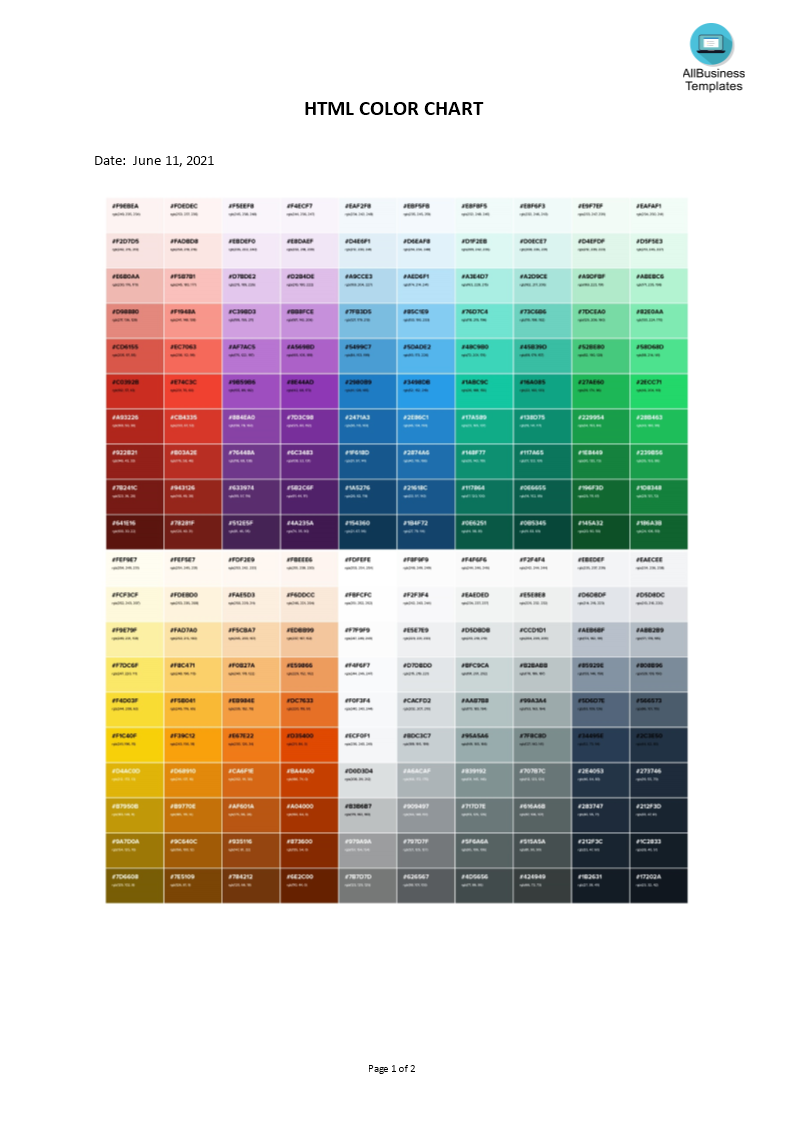HTML Color Chart
Save, fill-In The Blanks, Print, Done!

Download HTML Color Chart
Microsoft Word (.docx)Or select the format you want and we convert it for you for free:
Other languages available:
- This Document Has Been Certified by a Professional
- 100% customizable
- This is a digital download (615.07 kB)
- Language: English
- We recommend downloading this file onto your computer.
What is HTML color code? How do I get the color code from color?
HTML color codes are hexadecimal triples representing red, green, and blue (#RRGGBB). Each color that you view on your screen, has a common Hex Color Codes and Their RGB Equivalents. For example, for red, the color code is #FF0000, which is "255" red, "0" green, and "0" blue. There are 16,777,216 possible HTML color codes, and all are viewable on 24-bit monitors.
HTML color codes are identifiers used to represent colors on the web and other digital assets. Common color codes take the form: keyword name, hexadecimal value, RGB (red, green, blue) triplet or HSL (hue, saturation, lightness) triplet. The different values allow you to choose from 16,777,216 possible colors.
For example:
- Red = #FF0000 = RGB(255, 0, 0)
- Blue = #0000FF = RGB(0, 0, 255)
- Green = #008000 = RGB(1, 128, 0)
Today's computers/monitors can display thousands or millions of colors, so the concept of "web-safe colors" is no longer relevant. But many years ago, many computers were limited to displaying "8-bit color" with only 256 possible colors.
If you need a clear overview of colors and their respectable color codes, make sure you check out this chart.
Download this HTML Color Chart template for your reference.
DISCLAIMER
Nothing on this site shall be considered legal advice and no attorney-client relationship is established.
Leave a Reply. If you have any questions or remarks, feel free to post them below.
Related templates
Latest templates
Latest topics
- GDPR Compliance Templates
What do you need to become GDPR compliant? Are you looking for useful GDPR document templates to make you compliant? All these compliance documents will be available to download instantly... - Google Docs Templates
How to create documents in Google Docs? We provide Google Docs compatible template and these are the reasons why it's useful to work with Google Docs... - IT Security Standards Kit
What are IT Security Standards? Check out our collection of this newly updated IT Security Kit Standard templates, including policies, controls, processes, checklists, procedures and other documents. - Letter Format
How to format a letter? Here is a brief overview of common letter formats and templates in USA and UK and get inspirited immediately! - Google Sheets Templates
How to work with Google Sheets templates? Where to download useful Google Sheets templates? Check out our samples here.
cheese


